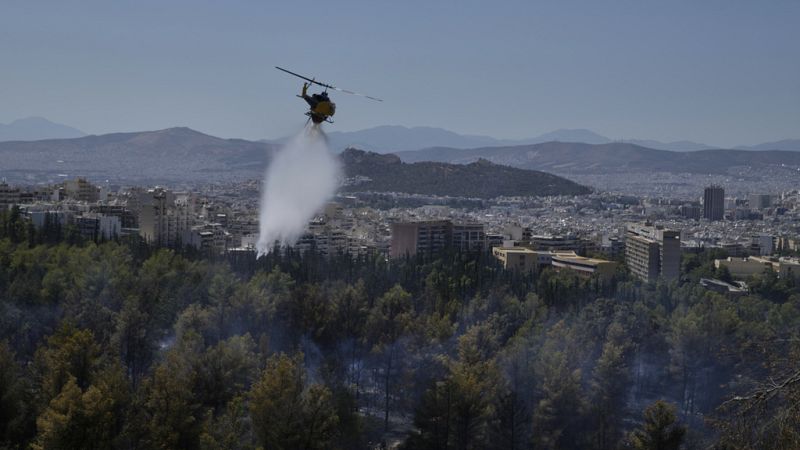Alerts and insurance: How to prepare for a summer holiday in Europe’s wildfire-prone destinations

This summer has seen dozens of heatwaves bake Europe, creating prime conditions for wildfires to break out.
An area almost the size of Luxembourg has been burnt by blazes so far this year.
Experts warn that climate change is exacerbating the situation.
If you are planning to travel to wildfire-prone areas this summer, here are some precautions you can take to ensure your safety should an emergency situation occur.
Europe battles dozens of wildfires
With major outbreaks in Spain, Portugal and deadly blazes in Greece since late June, the burned area is already far above the seasonal norm for Europe.
Temperatures soared over 40°C in southern France on Monday, prompting the French national weather authority, Météo-France, to place 12 departments on red alert.
“Don’t be fooled - this isn’t ‘normal, it’s summer.’ It’s not normal, it’s a nightmare,” agricultural climatologist Serge Zaka told broadcaster BFMTV.
In France’s Aude department, hundreds of firefighters remained guarding the edges of a massive, deadly blaze that scorched 16,000 hectares last week.
Across the English Channel, the UK’s Met Office expects the country's fourth heat wave of the summer to peak around 33°C in London on Tuesday. On Monday, 60 firefighters were called to tackle a blaze north east of the city.
In Spain, authorities on Monday began the preventive evacuation of several homes in the resort town of Tarifa in the Cádiz region of southern Spain after forest fires advanced towards the region, domestic media reported.
According to local reports, some 2,000 people, including beachgoers, vacation resort visitors and locals living near Playa de Atlanterra and Playa de Bolonia, were among those impacted.
Portugal sent reinforcements to combat three major wildfires on Monday as the country remains on high alert for heat risk after temperatures soared.
More than 650 firefighters, alongside 226 vehicles and six helicopters, were sent to combat a fire in the village of Freches in the district of Trancoso.
The blaze, which was fuelled by high temperatures and strong winds, threatened residents from at least four nearby villages.
In Bulgaria, temperatures were expected to exceed 40°C on Monday at the day's peak, with maximum fire danger alerts in place.
Nearly 200 fires have been reported; most have been brought under control, localised and extinguished, but the situation remains “very challenging,” said Alexander Dzhartov, head of the national fire safety unit.
In Türkiye, a wildfire in the province of Canakkale, fueled by high temperatures and strong winds, forced authorities to evacuate holiday homes and a university campus and to suspend maritime traffic.
In Hungary, Sunday brought a new national high of 39.9°C in the southeast, breaking a record set in 1948. Budapest also recorded a city record at 38.7°C.
Authorities imposed a nationwide fire ban amid extreme heat and drought.
How to prepare for a holiday in wildfire-prone destinations this summer
A key precautionary measure when visiting wildfire-prone destinations is staying informed of any warnings.
Before your trip, research the specific area you're visiting and be aware of the fire danger ratings and local emergency procedures.
Ensure that your mobile phone is registered to receive emergency alerts. You can do this by going into Settings, followed by Notifications, and Enabling Alerts.
Monitor local news, weather forecasts, and fire updates through official channels like emergency apps and websites.
If travelling to Greece, for example, register for alerts from the Greek government’s Emergency Communication Service. You should also follow @112Greece on X for official updates.
The UK government also recommends preparing a ‘grab bag’ of essentials, including passports and ID cards, mobile phones and chargers, money and bank cards, essential medicine, and insurance documents.
If there is a heatwave warning during your trip, take precautionary measures like carrying extra drinking water or avoiding high-energy outdoor activities in the middle of the day. Follow local advice about what to do and what not to do during periods of prolonged high temperatures.
Older travellers and those with certain health conditions should be especially careful not to exert themselves.
If your itinerary involves outdoor adventure, it might be worth asking your travel provider if you can change your plans or dates if a heatwave is expected.
Ensure you have the right travel insurance for wildfire coverage
When booking travel insurance, make sure you choose a policy that will refund you or entitle you to compensation should wildfires affect your holiday.
This is particularly important if you choose not to go ahead with your trip, even if the airline, tour operator or accommodation has not cancelled your bookings.
This is because, without an official ‘no-go’ warning from foreign governments, travellers who choose not to go ahead with their trip are unlikely to receive reimbursement or compensation, as this is considered “disinclination to travel”.
The vast majority of travel insurance policies will also not cover situations of “loss of enjoyment” due to wildfires, which includes being unable to leave your hotel.
Travellers can only expect refunds if their flights or accommodation are cancelled by airlines, providers or tour companies.
Some insurance policies include trip disruption or natural disaster cover, which usually applies to wildfire-related issues, but not every company will offer this, so make sure you have the correct insurance before you leave.
Today

